The automotive and furniture industries, seemingly disparate in many ways, are finding common ground through the use of wool felt wheels. In automotive manufacturing, wool felt wheels are crucial for achieving a high – gloss finish on vehicle exteriors. Furniture manufacturers, on the other hand, rely on these wheels to bring out the natural luster of wood surfaces. By sharing insights and experiences regarding the use of wool felt wheels, these two industries are able to optimize their polishing techniques. For example, automotive experts have shared their knowledge of using wool felt wheels in combination with specialized polishing compounds for faster cutting, which furniture makers have adapted to reduce the time required to finish large wooden surfaces. This cross – pollination of ideas not only improves efficiency but also drives the development of new products and services.
The jewelry and electronics industries are also engaging in collaborative efforts centered around wool felt wheels. Jewelry artisans require precision and finesse when polishing precious stones and metals, while electronics manufacturers need to ensure the smooth and scratch – free finishing of delicate components. Through joint research projects, they are exploring how to customize wool felt wheels for their specific needs. For instance, they are developing wool felt wheels with unique fiber arrangements that can conform to the complex geometries of both jewelry settings and micro – electronic parts. This collaboration has led to the creation of hybrid wool felt wheels that can be used across both industries, reducing the need for separate, specialized tools.
The construction and metalworking industries are another pair that is leveraging the potential of wool felt wheels for collaborative innovation. In construction, wool felt wheels are being used to polish and maintain the surfaces of metal fixtures, such as handrails and decorative elements. Metalworking companies, which produce these fixtures, are working closely with construction firms to understand the specific requirements of on – site finishing. Based on this feedback, metalworking manufacturers are modifying the design of wool felt wheels to better withstand the harsh conditions of construction sites. They are also developing wheels that can be easily attached to portable power tools commonly used in construction, enabling workers to perform quick touch – ups and finishing tasks without the need for bulky equipment.
Cross – industry synergy driven by wool felt wheels is not only beneficial for individual companies but also has a positive impact on the overall manufacturing ecosystem. It encourages the sharing of best practices, reduces redundant research and development efforts, and promotes the growth of a more sustainable and efficient industry. As more industries recognize the value of collaboration in the context of wool felt wheel applications, we can expect to see even more innovative solutions and a deeper integration of these versatile tools across the global manufacturing landscape.
Pushing the Boundaries: Advanceme
Post time: Jun-06-2025

